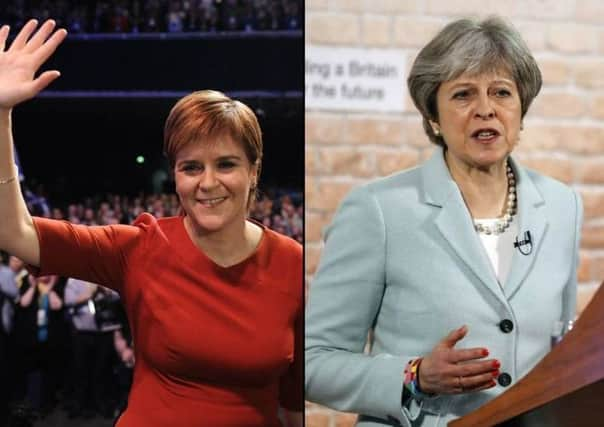How '˜Brexit power grab' row could influence negotiations


Nicola Sturgeon has taken to the pages of this morning’s Scotsman to outline her opposition to the terms of Britain’s departure from the EU as it stands.
It comes as a row over a so-called ‘Brexit power grab’ continues apace, with Nicola Sturgeon and her Brexit Secretary Michael Russell refusing so far to sign up to the so-called ‘Great Repeal Bill’.
Advertisement
Hide AdAdvertisement
Hide AdThat bill deals with, among other weighty issues, the transfer of 111 powers that will return from Brussels after the UK leaves the EU.
They are significant because they are in areas of legislation which are traditionally devolved, but which will return to the UK Government in the first instance.
Prime Minister Theresa May, for her part, says this is a mere formality, and that the powers will then be transferred to the relevant devolved administrations as soon as it is feasible.
With Ms Sturgeon blaming the Tory backbenches for the stalemate, and using it to push for a ‘softer’ Brexit, we look at how the row could hamper progress on a wider Brexit deal.
A ‘constitutional crisis’
That type of language has been bandied about with worrying regularity since the Brexit vote in 2016 shocked many in the country.
With this current row, however, it seems entirely inappropriate.
As it stands, the Scottish Parliament will almost certainly vote to withhold ‘legislative’ consent if an agreement can’t be reached on the transfer of those powers.
While the SNP talk of a ‘power grab’, and the Conservatives in Holyrood and Westminster accuse them of acting irresponsibly, a constitutional crisis could start to become the norm.
Advertisement
Hide AdAdvertisement
Hide AdFor the Great Repeal Bill to become law, that legislative consent from Holyrood isn’t legally required, but it is still considered by many to be essential, especially as the lack of consent could give a boost to those seeking to bog down the Brexit legislation in the House of Lords.
The Brussels position
The First Minister is not just using the Great Repeal Bill to push for a softer incarnation of Brexit than the UK Government currently proposes.
Ms Sturgeon has sought to tie the devolution settlement into her argument (a version of which has been proposed by Labour’s Jeremy Corbyn) that the UK (or just Scotland) could remain in the EU single market.
In her Scotsman piece, Ms Sturgeon says that the benefits of devolution in Scotland have been ‘reinforced’ by the country’s membership of the EU single market.
Deliberately or otherwise, Ms Sturgeon’s dismissal of the hard Brexit pushed for by many Conservative voices aligns her with the position taken by European Union officials.
The preferred divorce settlement set out by the UK Government has been variously labelled unrealistic, complicated, and expensive, by EU figures.
Conservative danger
While some may argue that it is handy for the Conservatives to have both the devolved governments and the EU seemingly on one side, there are pitfalls everywhere for Theresa May’s Government.
They remain confident that a deal can be done with the Scottish and Welsh Governments on the Repeal Bill, but have already missed their own deadline of amending the bill before it was sent to the House of Lords.
Advertisement
Hide AdAdvertisement
Hide AdEU negotiators are also taking a firm line on the contentious issue of the Irish border, with discussions still at an impasse.
The more that forces within the EU, and within the UK, are aligned in opposition to the Government’s plans, the harder they are to sell to the public.
While the UK Government could (and often do) contend that there are ideologies, vested interests, and political opportunism behind some elements of that united opposition to the current Brexit plan, that strategy has a limited shelf life.
As the date of Britain’s departure approaches, intransigence can only get either of the Governments so far.
Devolution, and an orderly Brexit, could yet come down to the individual negotiations between Theresa May and Nicola Sturgeon.
